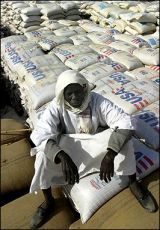WFP says truck thefts hamper Darfur aid delivery
KHARTOUM, March 15 (Reuters) – The World Food Programme (WFP) fed a record number of people in Sudan’s Darfur region in February, but the theft of some of its trucks in the region has hampered operations this month, the U.N. body said on Tuesday.

|
|
A displaced Sudanese man guards humanitarian aid from the World Food Program at Kalma refugee camp near Nyala town in Sudan’s south Darfur region. (AFP). |
“Such attacks sabotage the delivery of food to Darfur and increase the cost because transporters hike their rates because of the increased risks,” WFP said in a statement.
The WFP is supplying food to some of the 2 million people in Darfur forced from their homes by fighting which started in early 2003, when rebels launched an uprising against Khartoum.
In West Darfur, the WFP said U.N. agencies and non-governmental organisations had moved to the capital El-Geneina because of banditry and rising tensions. Roads in West Darfur have been notorious for banditry in recent months.
WFP said it fed more than 1.6 million people in Darfur in February — the highest monthly total since it began emergency operations in Darfur in April 2004.
But it said banditry in March had hampered operations. WFP said nine of its trucks were still missing after a series of attacks on convoys.
Eleven WFP-contracted trucks were stolen and a driver shot and wounded in three incidents in North Darfur on March 7. Six of the trucks were later abandoned when they ran out of fuel.
The WFP said it was still trying to find out who was stealing its trucks.
The Sudan Liberation Army (SLA), one of the main Darfur rebel groups, had still not returned eight trucks they took in South Darfur state last November, the WFP said.
The attacks come a few months before the height of the rainy season in Darfur in July and August when many roads become like quick sand and trucks cannot travel. Expensive air drops are then needed to supply food to the displaced.
Darfur rebels accuse the government of neglect and of preferential treatment of Arab tribes at the expense of non-Arabs in the remote region. The fighting has killed tens of thousands.
The United Nations says the government armed some Arab militias, known locally as Janjaweed, to fight the rebels. The Janjaweed now stand accused of widespread rape, killing, looting and burning of villages.
Khartoum calls the Janjaweed outlaws and denies any links to them.
